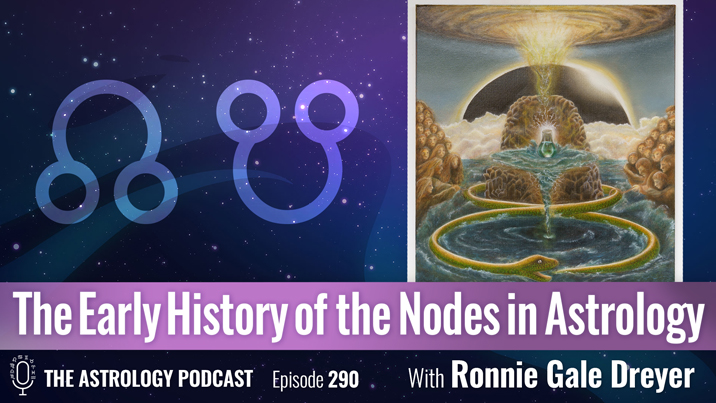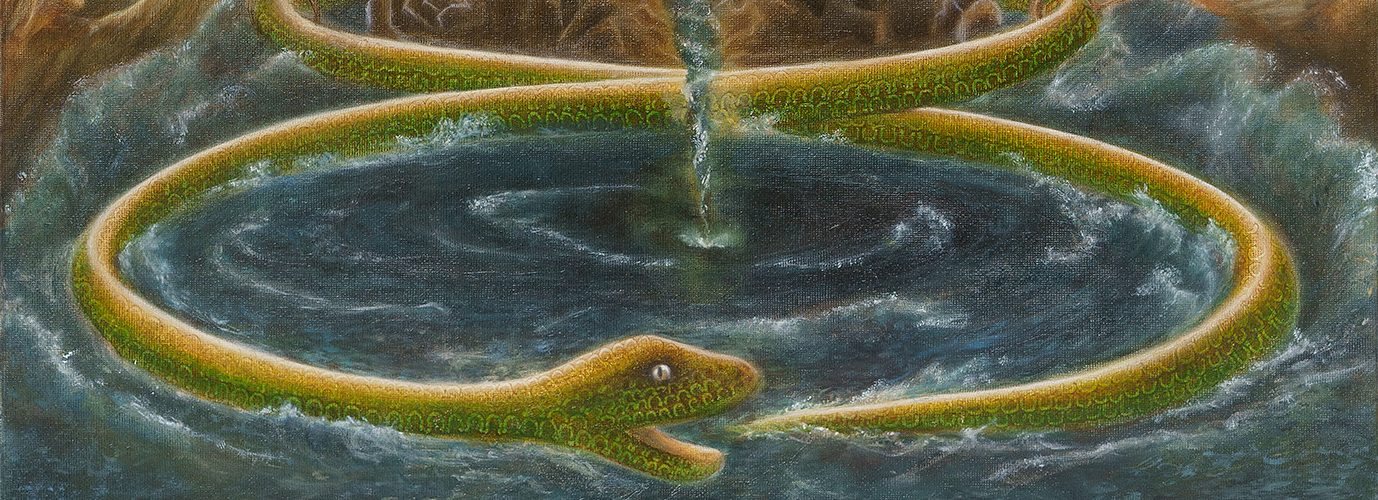
In episode 290 astrologer Ronnie Gale Dreyer joins the show to talk about the early history and meanings of the nodes in astrology, both in the western and Indian astrological traditions.
As discussed in episode 127, in the late 20th and early 21st century the nodes came to be associated with one’s past and future life in modern western astrology, but these associations are absent from the tradition if you look back more than a century or so.
The premise of this discussion, then, is what did the nodes mean in the older traditions of astrology if they didn’t have to do with past lives?
Ronnie is the author of the book Vedic Astrology: A Guide to the Fundamentals of Jyotish, and she is also a Sanskrit scholar who is currently working on a translation of a 4th century Indian text on applying astrology to the lives of women.
Together we set out to explore and discuss the early history of the nodes in eastern and western astrology.
You can find out more information about Ronnie on her website:
The painting featured in the cover art for this episode is by astrologer Shu Yap, and depicts the Samudra Manthan story, which we mention at one point in this episode as being connected to Hindu legends surrounding the origins of the nodes. You can follow Shu on Instagram:
This episode is available in both audio and video versions below.
Timestamps
Here are some timestamps for topics covered at different points in the episode:
00:00:00 Intro
00:01:00 Ronnie’s book and background
00:14:45 History of women in astrology
00:20:39 The nodes and past lives
00:30:54 Interaction between Eastern and Western astrology
00:36:39 Mythology of Rahu and Ketu
00:39:19 Ancient mentions of the nodes
00:48:58 Parashara and nodes
00:57:30 Nodes, malefics, and outcasts
00:59:00 Nodes, the ecliptic, eclipses
01:01:30 Valens on the nodes
01:05:40 Rahu like Saturn, Ketu like Mars
01:07:40 Delineations from Phaladeepika
01:10:00 Houses 3, 6, 10, 11 and Rahu
01:14:18 Houses 4, 5 and Rahu
01:16:00 Rahu and Ketu as malefics
01:20:59 Houses 7, 10, 9, 11 and Rahu
01:24:40 House 12 and Rahu
01:25:00 Houses 1, 2, 3, 4, 6, 7, 8 and Ketu
01:29:56 Houses 9, 10, 11, 12 and Ketu
01:32:44 Dragon and the nodes
01:34:49 Exaltations of the nodes
01:37:44 Opinion According to the Chaldeans
01:43:30 Turning point of nodes in history
01:47:25 Persian tradition
01:48:35 More about the dragon
01:51:30 Guido Bonnati on the nodes
01:58:58 More on the Vedic nodes
02:02:25 Rudhyar and evolutionary astrology
02:11:38 Three traditions of the nodes
02:16:21 Outer planets and the nodes
02:19:47 How Chris uses the nodes
02:22:38 Nodes and eclipses
02:27:54 Ronnie’s work and website
02:28:44 Closing remarks
Watch the Video Version of This Episode
Here is the video version of this episode on the Moon’s nodes:
–
Transcript
A full transcript of this episode is available: Episode 290 transcript
Listen to the Audio Version of This Episode
You can either play the audio version of this episode of the podcast directly from the website or download it as an MP3 to your device by using the buttons below:
Podcast: Play in new window | Download (Duration: 2:32:37 — 140.0MB)


This was one of the most interesting podcasts I heard in the Astrology Podcast, fascinating in many ways – I could listen to Ronnie for hours. It was extremely rich to get to know more about the mythology surrounding Rahu and Ketu and the way the Hellenistic, Vedic and Persian astrology influenced each other. Also, the interpretation keys from the vedic tradition of the nodes in the houses were eerily precise. I feel I definitely have a research path to thread in what concerns the nodes and eclipses. Thank you.
Also, I would be very grateful if you could give me the reference of the texts that were read during the discussions, as I would like to look for them and read them carefully.
The academic article we referenced at one point about the early history of the nodes in the west was Adrian Pirtea, “From Lunar Nodes to Eclipse Dragons: The “Fundaments of the Chaldean Art” (CCAG V/2, 131-40) and the Reception of Arabo-Persian Astrology in Byzantium,” available on Academia.edu here:
https://www.academia.edu/41560714/From_Lunar_Nodes_to_Eclipse_Dragons_The_Fundaments_of_the_Chaldean_Art_CCAG_V_2_131_40_and_the_Reception_of_Arabo_Persian_Astrology_in_Byzantium
I think the Guido Bonatti translation must have been from Benjamin Dykes translation of that text.
The Indian text we read some nodes delineations from was the Phaladeepika By Mantreswara.
Was this book also mentioned (and recommended) in passing by Ronnie, or did I mishear?
https://www.janspiller.com/product/astrology-for-the-soul/
I think that book may have been mentioned in passing as an example of a modern western book that takes the past life premise for granted, but I’m not sure that it was recommended.
Ronnie mentions that theosophy “was based/started in India” (around 29:30) which I found strange and concerning as I have never heard this. Every other source says it began in New York City, where she is from. It was mentioned almost in passing but I’d love to hear more about this.
I think she was just talking about how their headquarters moved to India at some point for a while later on in the early 20th century. There is a really good book that talks about the early history of the Theosophical Society that was assigned reading at Kepler titled Madame Blavatsky’s Baboon by Peter Washington.
Hi. Can. You get more
Of Ronnie on Podcast
That is because Blavatsky’s sources were Indian. It is essentially a syncretism between European and Indian forms of mysticism. She was a Russian immigrant to the US. The initial legal form of the Society was New York.